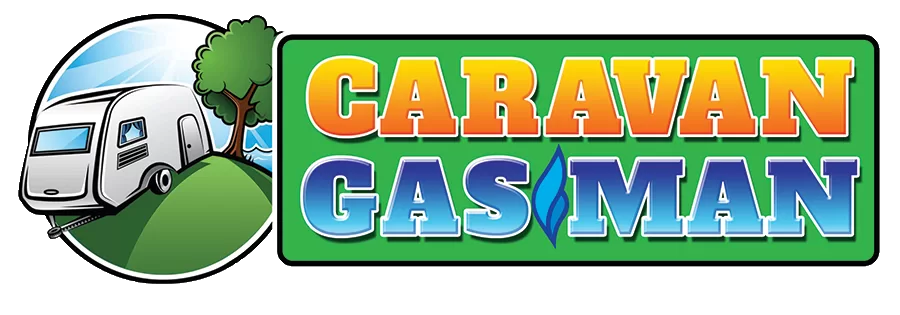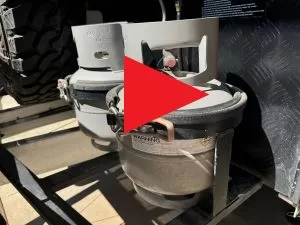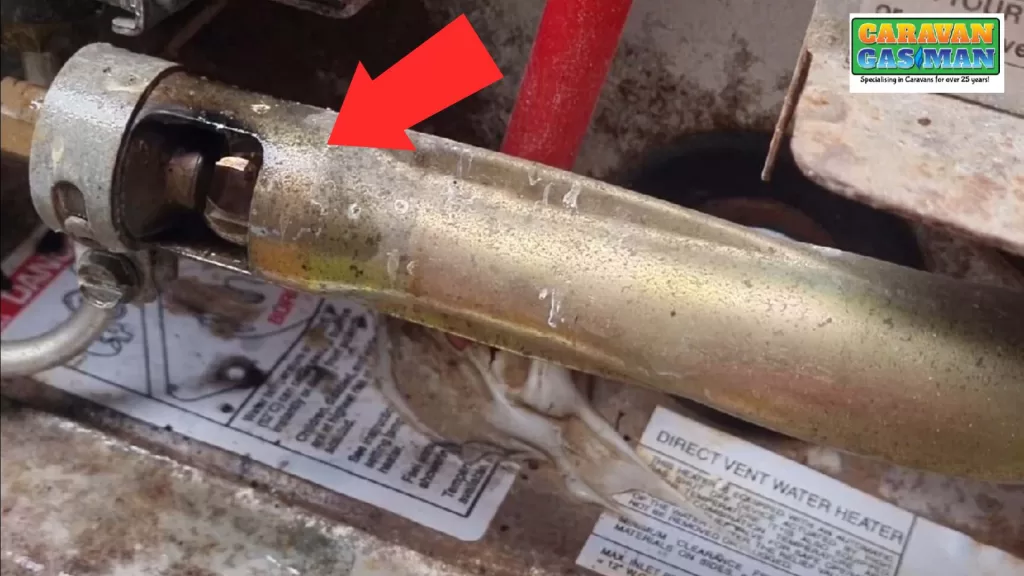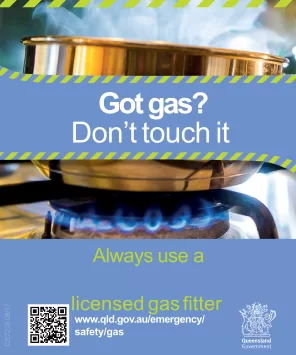Think you might have a gas leak in your caravan?
Don’t hesitate—check it out ASAP! Gas leaks can turn your fun adventure into a fiery inferno!
Not only do they pose serious fire risks endangering your caravan, equipment and in severe cases your family’s lives. But exposure to gas can also leave you feeling dizzy and nauseous and cause serious headaches.
What are the signs that you have a gas leak?
If you notice you’re using more gas than usual, detect a gas smell, or find that your gas appliances are giving error codes or failing to light, you might have a gas leak. This isn’t just a safety risk it can hurt the hip pocket as well, not to mention the frustration of getting to camp only to find that your gas has escaped somewhere back down the track and you’re stuck with an uncooked dinner and a cold shower!

All Caravan Gas Man mobile technicians are fully licenced and qualified gas fitters, backed by Adam’s over 35 years of experience in the Gas and Caravan industry. With this strong foundation of expertise and hands-on knowledge, you can trust them to provide safe, reliable, and professional service—no confusing jargon, just down-to-earth, good service. Call Adam at Caravan Gas Man on 0402 116 427.
So, if Gas is so ‘dangerous’, why are we still using it in our caravans?
In reality Liquid Petroleum Gas (LPG) is no more or less dangerous than any other form of energy used in caravans. The most popular alternative to gas is lithium battery systems with electric cooktops and fridges etc.
Both gas and lithium present their own safety risks:
Gas: Is flammable and can lead to explosions or fires if there are leaks or improper usage. Carbon monoxide poisoning is also a concern if gas appliances aren’t vented properly.
Lithium: Lithium-ion batteries have the potential to overheat, catch fire, or even explode if they are damaged or improperly charged. Issues such as thermal runaway can occur, especially with low-quality batteries or due to manufacturing defects. Because of the toxic gases released during charging, batteries cannot be installed in a living area, such as inside a caravan or camper trailer, unless placed in a sealed enclosure. The installation location has to be sealed off from the living area, and the sealed-off area is vented to the exterior environment. It’s important to note that lithium fires may continue to burn even when doused with water, so specialised extinguishing agents are often required.
In terms of day-to-day risk, it often comes down to context and how each is used. Proper safety measures and maintenance can mitigate the risks of both. Overall, neither is inherently more dangerous than the other; it depends on the situation and how you manage them.
So why use LPG?
1. Efficiency and Convenience
- Cooking: Gas stoves provide instant heat and precise temperature control, making them ideal for cooking meals on the road.
- Heating: Gas heaters are effective for warming caravans in colder weather, providing a quick and efficient way to maintain comfort.
- Refrigeration: If you intend to spend a long time in one spot off-grid, a 3-way fridge is the most efficient option to keep your beers frosty. Don’t get me wrong, compressor fridges are great, but they draw a lot of power from your batteries every day, so if you encounter a few days of bad weather, you may find your solar struggling to keep your batteries full!
2. Availability
- Refillable Bottles: Swap ’n’ Go LPG bottles can be easily sourced from many service stations, camping stores, and other retailers across Australia. Even in more remote areas such as on the Birdsville and Oodnadatta tracks! In larger towns camping and hardware stores offer refilling services for a cheaper price.
3. Weight Considerations
- Gas appliances tend to be lighter than electric alternatives, which is a significant factor in caravan design and efficiency, especially for towing. Not only that but the weight and storage of your batteries and solar requirements, not to mention the battery management systems needed.
4. Independence from Power Supply
- Using gas allows caravanners to enjoy off-grid camping without relying on electrical hookups, giving them more flexibility in choosing locations.
5. Long-Lasting Fuel
- Gas has a high energy density, meaning it lasts a long time, making it practical for extended trips without frequent re-filling. We recently spent a month on the road, using gas for our cooking and hot water needs we only used one 3.7kg bottle!
6. Versatility
- Gas can power hot water systems, refrigerators, heaters and even lights. Providing an all-in-one solution for caravan needs – no need to store several fuel types.
7. Ease of Use
- Gas systems are generally user-friendly, with straightforward controls for heating and cooking.
8. Cost
- Gas system setups are relatively inexpensive, whereas battery and solar system setups (especially Lithium batteries) can set you back over $10,000 not including the appliances.
What’s the easiest way to check for gas leaks in my caravan?
Using soapy water to check for gas leaks is effective and simple. Mix 10% Truck Wash with 90% water in an atomiser spray bottle (See note below), and spray the suspected leak area, if there’s a leak, the gas will rise through the soapy water causing bubbles to form. If you’re worried that the soap solution may contain ammonia, rinse all connections thoroughly with fresh water as soon as possible after finishing the leak test.
NOTE: DON’T use dishwashing liquid as ammonia may be present in some soaps and detergents which reacts with brass fittings causing them to crack and leak after a short period.
Other ways to check for leaks are:
1. Visual Inspection
- Check Connections: Examine all gas connections, including hoses, fittings, and appliances. Look for signs of wear, cracks, or corrosion.
- Inspect the Appliances: Look closely at gas appliances like the stove, heater, and fridge for any signs of gas escaping.
2. Use a Gas Leak Detector
- Portable Detector: Consider using a portable gas leak detector. These devices can provide a more sensitive and precise reading of gas leaks.
3. Listen for Hissing Sounds
- In a quiet environment, listen for any hissing sounds near gas appliances or lines, which could indicate a leak.
4. Smell for Gas
- Gas has a distinct odour (similar to rotten eggs) due to the added scent. If you detect this smell, it could indicate a leak.
NEVER use matches, lighters, or anything that could create a spark while checking for leaks.
AND
If you detect a strong smell of gas, evacuate the caravan immediately and if it’s safe to do so, shut off your gas system at the bottles.
What to do if you find a gas leak
Turn off your gas at the bottles and contact your nearest fully qualified caravan gas fitter for an inspection. It’s always better to be safe than sorry!
Be sure to use a caravan gas fitter for all your caravan needs. I’ve heard many stories that would curl your toes!
One caravanner had their caravan checked by a plumber with a limited gas licence. They were told that everything was fine. But when they got to camp, they found a huge rip in the pigtail and no gas left in the bottle – to make it worse this was New Year’s Eve – no fridge, no dinner and no shower!
Having a qualified gas fitter who understands how its gas system works from top to bottom is so important. With over 35 years of experience in the gas industry and over 30 years focused on mobile caravan gas services, Adam is a true expert in his field. When it comes to caravan gas, what Adam doesn’t know isn’t worth knowing! He leads his hand-picked team of fully qualified gas fitters, and even other gas professionals seek his advice.
Caravan Gas Man’s mobile technicians—Daniel and Anthony—deliver top-quality, professional, and friendly service. Both fully qualified, licenced, and insured, they excel in every aspect of caravan gas services, from gas certificates to appliance repairs, regular maintenance, and gas installations.
They can quickly diagnose and fix issues on-site, providing clear, no-jargon explanations that make everything easy to understand.
With well-stocked mobile vans, we handle repairs and maintenance swiftly, minimising downtime and ensuring your caravan stays compliant with all safety regulations. From gas safety checks to complete installations, our team provides fast and reliable solutions to keep your caravan running smoothly.
Continue reading….
When it comes to your caravan, safety is no joke—especially when dealing with gas installations. That’s why having a fully qualified and licensed gas fitter inspect your caravan is as crucial as packing marshmallows for a campfire! After all, no one wants their caravan to become the campfire! So when it comes to your caravan gas certificate, don’t trust just anyone with your safety!
Having a Caravan Gas Certificate is not only a requirement for registration of your caravan, camper or motorhome. It also ensures that your vehicle is safe to use and meets the necessary gas safety standards.
It’s also worth noting that having a Caravan Gas Certificate isn’t just for vehicle registration, it is for the safety of everyone using the vehicle.





